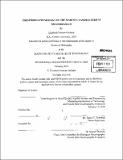| dc.contributor.advisor | Sonya T. Dyhrman. | en_US |
| dc.contributor.author | Orchard, Elizabeth Duncan | en_US |
| dc.contributor.other | Woods Hole Oceanographic Institution. | en_US |
| dc.date.accessioned | 2010-09-03T18:29:47Z | |
| dc.date.available | 2010-09-03T18:29:47Z | |
| dc.date.issued | 2010 | en_US |
| dc.identifier.uri | http://hdl.handle.net/1721.1/58373 | |
| dc.description | Thesis (Ph. D.)--Joint Program in Oceanography/Applied Ocean Science and Engineering (Massachusetts Institute of Technology, Dept. of Biology; and the Woods Hole Oceanographic Institution), 2010. | en_US |
| dc.description | "February 2010." Cataloged from PDF version of thesis. | en_US |
| dc.description | Includes bibliographical references. | en_US |
| dc.description.abstract | Primary producers play a critical role in the oceanic food chain and the global cycling of carbon. The marine diazotroph Trichodesmium is a major contributor to both primary production and nitrogen fixation in the tropical and subtropical oceans. These regions are often characterized by low phosphorus (P) concentrations, and P deficiency of Trichodesmium could limit growth, and constrain nitrogen fixation by this genus. Three key components of P metabolism in cyanobacteria include: inorganic phosphate (Pi) uptake, dissolved organic phosphorus (DOP) hydrolysis, and polyphosphate (polyP) biosynthesis and catabolism. These three pathways lay the foundation for the four chapters that make up the body of this thesis. Chapter two examines the relative importance of Pi and DOP in Trichodesmium in the Sargasso Sea by measuring uptake rates and uptake kinetics of ³³pi and DOP (using alpha labeled adenosine-5'-triphosphate ³³P-ATP as a model P ester compound). The in situ uptake rates suggest that the contribution of P ester to total P uptake can be greater than 25% for Trichodesmium, and therefore P esters are important for supplementing Trichodesmium's P demand. Chapter three confirms the presence of polyP in the Sargasso Sea populations. This is the first detection of polyP in an oligotrophic system and may indicate micro-scale variability in DIP or DOP supply. Chapter four examines the regulation of several genes involved in P scavenging in cultures of Trichodesmium erythraeum IMS101: two copies of a high affinity phosphate binding protein (pstS and sphX) and two putative alkaline phosphatases (phoA and phoX). | en_US |
| dc.description.abstract | (cont.) Chapter five calibrates the expression of phoX to decreases in nitrogen fixation rate in Trichodesmium cultures allowing the use of phoX expression as a molecular indicator of P limitation of nitrogen fixation. Detection of phoX expression in the North Atlantic and South Pacific identified the extent and magnitude of P limitation in these regions. Taken together this thesis provides new insights into how Trichodesmium survives in low P environments, utilizes DOP, stores polyP, and the extent to which P can limit nitrogen fixation by this genus. | en_US |
| dc.description.statementofresponsibility | by Elizabeth Duncan Orchard. | en_US |
| dc.format.extent | 130 p. | en_US |
| dc.language.iso | eng | en_US |
| dc.publisher | Massachusetts Institute of Technology | en_US |
| dc.rights | M.I.T. theses are protected by
copyright. They may be viewed from this source for any purpose, but
reproduction or distribution in any format is prohibited without written
permission. See provided URL for inquiries about permission. | en_US |
| dc.rights.uri | http://dspace.mit.edu/handle/1721.1/7582 | en_US |
| dc.subject | Biology. | en_US |
| dc.subject | Joint Program in Oceanography/Applied Ocean Science and Engineering. | en_US |
| dc.subject | Woods Hole Oceanographic Institution. | en_US |
| dc.subject.lcsh | Primary productivity (Biology) | en_US |
| dc.subject.lcsh | Cyanobacteria Physiology | en_US |
| dc.title | Phosphorus physiology of the marine cyanobacterium Trichodesmium | en_US |
| dc.type | Thesis | en_US |
| dc.description.degree | Ph.D. | en_US |
| dc.contributor.department | Joint Program in Oceanography/Applied Ocean Science and Engineering | en_US |
| dc.contributor.department | Woods Hole Oceanographic Institution | en_US |
| dc.contributor.department | Massachusetts Institute of Technology. Department of Biology | |
| dc.identifier.oclc | 615587376 | en_US |
